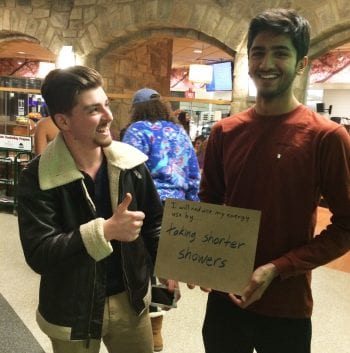The Office of Sustainability, in partnership with Residential Life and Facilities, is excited to announce the launch of WashU’s eighth annual Green Cup competition! Among Washington University’s South 40 Residential Colleges and School of Medicine residents, leagues will compete to reduce their energy usage.
A Competition to Save Energy
On the Danforth campus, electrical energy use from lights, dryers, laptops, chargers, refrigerators, microwaves, TVs, and other electrical devices will be measured over the four-week competition period and compared to a baseline. Last year, some Residential Colleges were able to reduce their electrical consumption by 20% with simple adjustments to everyday habits. On the South 40, the 2017 Green Cup saved nearly 100 metric tons of CO2 in a single month, which is the equivalent of taking 20 cars off the road for an entire year.
There are numerous ways to reduce residential energy use, and the Green Cup competition is the perfect occasion to learn and share knowledge. While it can be easy to turn lights off when leaving a room or unplugging device chargers when not in use, reducing energy consumption often requires some level of lifestyle change. With Green Cup, students are invited to reflect on their own energy usage and to take action to reduce their carbon footprint. Some commit to using the stairs rather than the elevator, some will take shorter showers, and others will turn off their mini-fridge.

A Competition to Foster Sustainable Living
To win the Green Cup, teams have to not only reduce energy usage but also participate in education programs and events. Attendees of the Green Cup kickoff event, taking place February 6th at 9pm in the Mudd multipurpose room, will receive a quick energy reduction training and collectively brainstorm ways they can apply these principles to their everyday lives. Weekly quizzes will also allow students to test their knowledge of different key areas of sustainability such as waste, biodiversity, or transportation.
On the South 40, the efforts of the Office of Sustainability are widely supported by the EcoReps whose role is to promote sustainability within their Residential Colleges and to make College Council programming more sustainable. During Green Cup, EcoReps serve as captains to foster more energy-conscious lifestyles among WashU freshman and sophomores by displaying posters around Residential Colleges, engaging with their peers and setting the example. Jacob Halladay-Glynn, leader of the EcoRep program, explains this year’s strategy to reduce energy use on the S40: “Working with the Office of Sustainability to determine the most effective strategies for energy reduction, the Eco-Reps and I are pushing three major points: Keep thermostats at 70 degrees or under during the wintertime; wash clothes in cold water and turn off the lights when you leave, or even when you’re home if you’re using a backlit computer or phone!”
Student Efforts at WUSM
At the School of Medicine, the Student Sustainability Committee is leading the Green Cup efforts. Chanelle Chua, first year medical student and part of the WUSM Sustainability Committee, sees Green Cup as the opportunity to engage with students on a broad variety of topics. She will coordinate with the Office of Sustainability to host a “Recycling Genius” training in the Farrell Learning and Teaching Center. By following this brief yet in-depth training on recycling and composting, medical students will become recycling geniuses and earn points in the Green Cup competition.
On the energy side, LED light bulb distribution has been a signature project of the WUSM Student Sustainability Committee. During the spring 2016 semester, utilizing support from the Student Sustainability Fund, the Student Sustainability Committee distributed nearly 1,000 LED light bulbs to medical students. The project successfully engaged many future physicians to improve air quality and mitigate climate change through the simple act of retro-fitting their lights.
Following the success of this inaugural “Light Up WUSM” event, the WUSM Sustainability Committee hosted a second distribution event in the fall of 2017. Griffin Plattner, second year medical student, tells us about the project: “Our event promoted the benefits of efficient, sustainable LED light bulbs. In one day, we dispersed over 1,000 bulbs to students, faculty, and staff across the medical campus to replace their less energy efficient incandescent and fluorescent lights. In addition to distributing new bulbs, we collected old bulbs from this year’s participants for proper disposal.”
The Green Cup Competition is powered each year by incredible student leaders on both campuses. Whether you are a student, faculty member, staff member, alum, or community partner, join us during the month of February in taking tangible steps to conserve energy and reduce your carbon footprint!